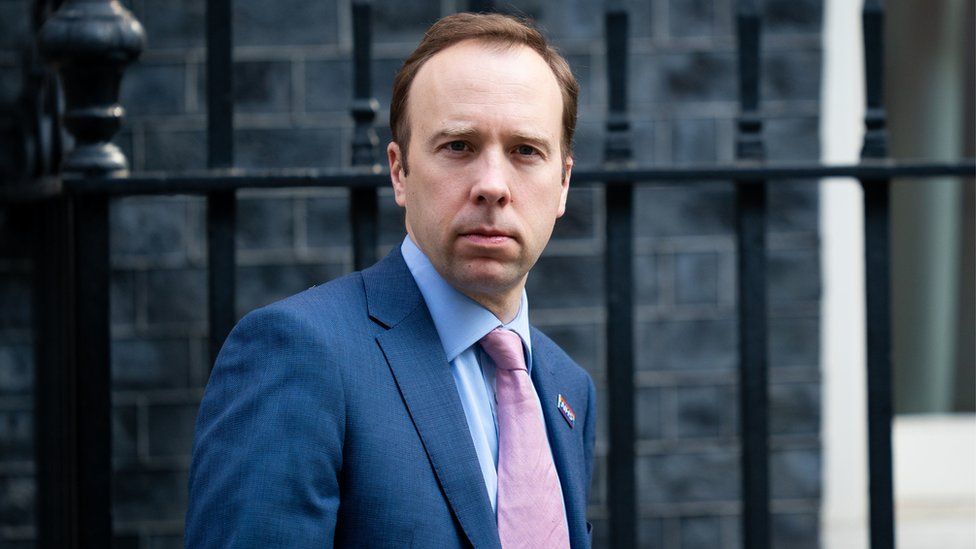Legal challenge over ministers' private email use
- Published

The Sunday Times reported that Matt Hancock used a private email for official business
The government is facing a legal challenge over the use of private email accounts and WhatsApp by ministers and senior officials.
Campaign group Good Law Project believes current official guidance on it leaves an "accountability gap".
It follows reports about health ministers using private email to discuss government business.
The government said the guidelines were "appropriate" and official business was conducted in line with guidance.
It is not against the rules for ministers to use private email - but Cabinet Office guidelines, external say "substantive discussions" and formal decisions should be accessible.
But Good Law Project believes the government's approach is unlawful - and is seeking to challenge it in the courts.
In a pre-action notice sent to a number of government departments and seen by the BBC, the group alleges the use of "non-governmental communications systems" breaches obligations to preserve records of decision-making.
The group, which campaigns for transparency and has raised a number of concerns about how government contracts were awarded during the pandemic, also says the current policy fails to comply with Freedom of Information laws.
The document refers to WhatsApp messages recently published by the PM's ex-adviser Dominic Cummings, which appear to show government business being discussed.
It also refers to reports in the Sunday Times that former health secretary Matt Hancock used a private Gmail address for government business.
Cabinet Office advice makes clear "substantive discussions or decisions generated in the course of conducting government business" should be accessible - for example by copying it to a government email address.
However, Good Law Project argues there is "little evidence" that messages sent by private email or WhatsApp "are generally recorded properly".
The organisation also argues the guidance is unfit for purpose, because it does not make clear when it is acceptable for personal email addresses to be used.
Health minister Lord Bethell, another of those named in the action, has said that while some third parties "in their enthusiasm" often contact ministers via their personal email accounts, "that's not the same as using a personal email for formal departmental decision-making".
He has also told peers: "I am absolutely rigorous in ensuring that government business is conducted through the correct formal channels."
'Appropriate arrangements'
Gemma Abbott, legal director of Good Law Project, said: "We don't just think the current approach is wrong, we think it's unlawful.
"If successful, this legal action could close this accountability gap, paving the way for a robust, lawful policy on the use of private email and Whatsapp."
The government has 14 days to respond to the Good Law Project's solicitors. It would then be for a court to decide whether a judicial review goes ahead.
A government spokesperson said: "There are appropriate arrangements in place for the management of electronic communications, including instant messages and emails.
"Ministers and officials are aware of the guidance around personal email usage, and government business is conducted in line with that guidance."
The UK's data watchdog is already looking into the use of private email accounts at the department for health.
Information commissioner Elizabeth Denham expressed concern it could lead to a "loss of transparency".
She wrote earlier this week: "My worry is that information in private email accounts or messaging services is forgotten, overlooked, autodeleted or otherwise not available when a freedom of information request is later made.
"This frustrates the freedom of information process, and puts at risk the preservation of official records of decision making."
Labour has demanded a "full scale investigation" into whether private emails had been used to discuss government contracts.
- Published23 April 2021